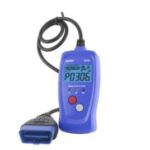Mileage verification is crucial for various auto insurance products, from pay-per-mile to usage-based pricing and traditional policies. While OBD-II dongles have been used for this purpose, relying on an Obdii Scanner Mileage reading for accurate verification has significant drawbacks. This article delves into why OBD-II dongles fall short in mileage verification and introduces a superior, software-based solution.
The Inaccuracy of OBDII Scanner Mileage for Verification
While on-board diagnostics (OBD) scanners are valuable tools for vehicle diagnostics and data retrieval, their approach to mileage estimation is far from precise when used for insurance verification. Understanding the limitations of obdii scanner mileage is key to appreciating why it’s not ideal for accurate policy pricing.
- Estimated, Not Actual Mileage: Contrary to common belief, OBD-II scanners typically do not access the vehicle’s actual odometer reading directly. Instead, an obdii scanner mileage calculation is often an approximation based on GPS location data and trip start and end points. This method inherently introduces inaccuracies. Inferring mileage from location and trip data can be skewed by GPS drift, signal loss, or incorrect trip detection. Small errors in trip start or end detection can accumulate, leading to substantial discrepancies over time.
Alt text: Locating the OBDII port in a vehicle, essential for connecting a mileage scanner.
- Inconvenience and Potential for Failure: OBD-II dongles, being hardware devices, require physical installation and are prone to practical issues. Policyholders must wait for delivery and then spend time locating the OBD-II port and correctly installing the device. This cumbersome onboarding process can deter potential customers right from the initial quote request. Moreover, once installed, these dongles can easily become loose, disconnect due to accidental knocks, or simply fail. Furthermore, some OBD-II devices can draw excessive power, potentially leading to battery drain, a major inconvenience for the policyholder and a potential support issue for the insurer.
Alt text: Installation process of an OBDII dongle for vehicle data access, highlighting potential user inconvenience.
-
Vulnerability to Intentional Tampering: Beyond unintentional failures, OBD-II dongles are susceptible to deliberate manipulation for mileage fraud. A policyholder seeking to lower their premium might simply unplug the device before a long drive. While some systems may detect tampering, the delay in detection allows for significant mileage to be unrecorded. By the time the dongle is reconnected, it’s impossible to accurately ascertain the unverified mileage, leading to premium leakage and financial losses for the insurance company. Relying solely on obdii scanner mileage from dongles opens the door to such fraudulent activities.
-
Privacy Concerns and User Trust: In an era of heightened privacy awareness, consumers are increasingly wary of constant tracking. OBD-II dongles, often perceived as “black boxes,” raise privacy concerns. Users have limited transparency regarding the data collected, how it’s transmitted to the insurer, and its subsequent usage. This lack of transparency can erode customer trust and create resistance to using obdii scanner mileage based insurance products. Policyholders may be hesitant to grant access to vehicle data through a hardware device whose operations are not fully clear to them.
-
High Costs Associated with Hardware: Implementing OBD-II dongle solutions involves significant expenses. Insurance businesses must procure the devices, manage shipping logistics to policyholders, and handle replacements for damaged or lost units. These hardware costs can quickly accumulate. If a customer switches insurers before the initial hardware investment is recouped, it directly impacts profitability. The cost of relying on obdii scanner mileage via OBD-II dongles extends beyond just the device itself, encompassing logistics, support, and potential losses from customer churn.
Car APIs: A Superior Solution for Accurate Mileage Verification
As vehicles become increasingly connected, software-based solutions offer a more effective and efficient approach to mileage verification. Car APIs, like Smartcar, provide a pure software alternative that overcomes the limitations of OBD-II dongles. For accurate obdii scanner mileage – or rather, actual odometer readings – APIs are the optimal path forward.
-
Pinpoint Accuracy with Direct Odometer Readings: Car APIs directly access the vehicle’s onboard computer to retrieve the precise odometer reading. Unlike obdii scanner mileage estimations from dongles, APIs provide the real, manufacturer-verified mileage. This accuracy translates to fairer pricing and underwriting for insurers and eliminates customer disputes arising from inaccurate mileage reporting.
-
Seamless User Experience and Unmatched Reliability: Smartcar’s API-based onboarding is remarkably simple. Customers can connect their vehicles in just a few clicks through a mobile or web application. There’s no waiting for device shipments or the hassle of physical installation. Customers simply log into their existing vehicle account and grant permission for data access. This streamlined process eliminates installation errors, connection issues, and battery drain concerns associated with OBD-II dongles, leading to a far more reliable and user-friendly experience.
-
Tamper-Resistance for Fraud Prevention: Car APIs enable regular, automatic odometer readings directly from the vehicle. This eliminates the possibility of mileage fraud. Policyholders cannot manipulate or hide mileage data, as the API retrieves data directly from the source. This robust system ensures accurate mileage data for every policy period, safeguarding against premium leakage and ensuring fair pricing. Moving beyond obdii scanner mileage estimations to direct API access is a critical step in fraud prevention.
-
Privacy-Centric Design with Transparency and Control: APIs prioritize user privacy through transparent permission frameworks. Customers are clearly informed about the specific data being requested (e.g., odometer, location) and can grant or deny access with a simple click. This granular control and transparency build trust and address privacy concerns associated with hardware-based tracking. In contrast to the “black box” nature of OBD-II dongles, APIs offer a privacy-respecting approach to mileage verification.
-
Cost-Efficiency and Scalability: Smartcar’s SaaS pricing model offers a cost-effective and scalable solution. Insurance companies avoid the significant costs associated with hardware procurement, shipping, and replacements. Resources are freed from managing physical devices, allowing for greater focus on core business functions: building superior insurance products and enhancing customer experiences. Shifting from obdii scanner mileage dongles to APIs represents a significant cost saving and efficiency improvement.
📱 Explore the Power of Car APIs: Learn from real examples of apps built with car APIs
Software-driven solutions are revolutionizing mileage verification for insurance companies. If you’re looking for a more accurate, reliable, and cost-effective alternative to obdii scanner mileage from OBD-II dongles, explore the potential of car APIs. Request a demo today to discover how Smartcar can transform your mileage verification process.


